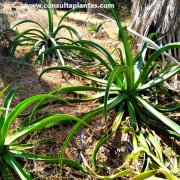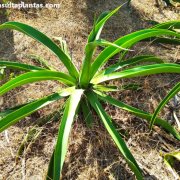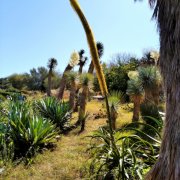Care of the succulent plant Agave vilmoriniana or Octopus agave |
|
The Agave genus, subfamily Agavoideae, comprises some 300 species of succulent plants native to Mexico, Central America and the Southwest of the USA. Some species are: Agave vilmoriniana, Agave angustifolia, Agave univittata, Agave lechuguilla, Agave stricta, Agave sisalana, Agave shawii, Agave potatorum, Agave parryi, Agave parrasana, Agave macroacantha, Agave filifera, Agave bracteosa, Agave attenuata, Agave americana, Agave victoria-reginae, Agave guadalajarana, Agave striata, Agave impressa, Agave deserti, Agave chiapensis, Agave palmeri, Agave vivipiara, Agave ferox, Agave ferdinandi-regis, Agave horrida, Agave datylio. Common names: Octopus agave, Midas Agave. This species is distributed by Sonora, Sinaloa, Jalisco and Aguascalientes, Mexico. They are elegant, fast-growing succulents that reach 1.20 meters (3.93 feet) in height and up to 2 meters (6.56 feet) in diameter. The attractive rosette-shaped wavy leaves are linear-lanceolate in shape, bluish-green or yellowish-green in color, ending in a soft thorn. After 8-10 years they produce a long flower spike (up to 6 meters/19.68 feet high) with yellow flowers. They bloom in spring or summer. On the flower stem they produce small suckers to self-propagate (the mother plant dies). Octopus agave is used in rockeries, on borders, on dry slopes, in cactus and succulent gardens, and in pots when young. They are ideal for Mediterranean coastal gardens. Agave vilmoriniana prefers full sun exposure but also grows in semi-shade. It does not resist frost. Midas Agave grows in any type of soil that has good drainage, be it sandy, poor or stony. Transplant in spring if the roots appear below the pot. Octopus agave is a very resistant to drought plant. Water occasionally in summer and spring; in autumn and winter they are maintained by the rains. Agave vilmoriniana does not need fertilizers. Pruning is not necessary but the mother plant must be removed when it dies after flowering. Octopus agave is a resistant plant to the usual pests and diseases. Agave vilmoriniana is propagated by separating suckers that can be produced at the base and from the seedlings that appear on the flower stalk. |
Images of the succulent plant Agave vilmoriniana or Octopus agave |
Find plants
Agave vilmoriniana or Octopus agave | Care and Growing
© 2026 FavThemes


